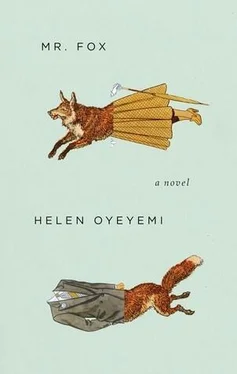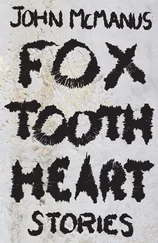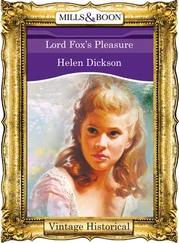S.J. came out of the house and stood beside me.
“Morning.”
Tentatively, without looking at me, he held out his hand. I took it and held it clasped to my chest. I didn’t look at him, either. We were eyeing the cedar.
“Morning.”
“What shall we do today?” he asked.
We went out walking, wrapped round in scarves and jackets. We tramped down lanes and places in the earth that seemed to have been dug and rubbed until granite came through, then abruptly left. We passed signs with names like Merrymeet and Tremar and Saint Cleer written on them, and by the time we crossed a low stone bridge with its feet in a shallow, pebbled brook our landscape was three-quarters blue. I began to step gingerly, even though I could see that the ground was firm all around me. There was so much sky that it felt as if we were on a precipice — there was not enough grass to stand on, it was so thin and flat by comparison. We walked around a barrow that rose from the long earth in the shape of a taut shoulder. Every now and again a bird coasted overhead, spreading shadows with the flap of its wings, and I would move uneasily, thinking that it must be coming for us, since there was nothing else for miles but flat tors and, in the distance, a hill so vast that it looked both broken and smooth as the eye tried to absorb its image all at once. I ruined my boots in what felt like an unending series of turf pits that had stored the previous week’s rainfall. I struggled in the last pit, thinking I was sinking, and S.J. crooked his arm and stood still on a safe spot, so I could take his elbow and step out. We came to a halt by a lake that seemed to have clouds in it even though it was a clear day. The moor swept on after the water interrupted it, and looking at the other side I felt doubled; without turning I could see what was behind me. S.J. told me stories about the lake. He was a good storyteller: matterof-fact, convincing. Excalibur had come out of this lake, he said, and I saw no reason to disbelieve him. I saw kites go up. Small figures rushed along up the hill, their wrists and fists leashed to the bright creatures in the sky. I want to stay here, I thought. I want to stay.
In the evening S.J. worked, even though he’d said he wouldn’t, sat in the study with huge books opened up all around him, underlining bits of the case studies he was taking notes from. I looked at some cookbooks for a while, then left him and went upstairs, to the blue room. With dramatic bravado, I switched all the lights on and went through Daphne’s things, moved them around recklessly, daring her. If I was afraid that something bad would happen, why wait? Why not make it happen now?
Some papers had been folded into a square and pushed into a corner at the back of one of the dressing-table drawers. The words were written in faded, grainy pencil strokes — I had to hold them under the lamp to make them out properly. There was a lot of crossing out. They were the same few sentences, over and over. Different drafts. The last one read:
I’ve drunk quite a lot of bleach. Enough to kill me,
I shouldn’t wonder. I did it on purpose.
Daphne
I put my head down on the desk because I felt braver with my head supported. In the corner of the last note, written in small letters and lightly, was L 11: 24–26. Without lifting my head, I dragged a King James pocket Bible, covered in white leather, out of another drawer in the dressing table. I set it in front of my nose and looked through it.
Leviticus. . Lamentations. . Luke. . well, it couldn’t be Lamentations, because that only had five chapters.
The Leviticus passage was incomplete; the first sentence of it referred to the sentence before it, and the last sentence was an admonition against eating pork and mutton.
Luke said:
When the unclean spirit is gone out of a man, he walketh through dry places, seeking rest; and finding none, he saith, I will return unto my house whence I came out.
And when he cometh, he findeth it swept and garnished.
Then goeth he, and taketh to him seven other spirits more wicked than himself; and they enter in, and dwell there: and the last state of that man is worse than the first.
My gaze snagged on two parts of the passage again and again:
I will return unto my house whence I came out. .
Seven spirits more wicked than himself.
I read the passage aloud. I couldn’t help it. Better that than keep it as a thought.
As I said the last word, the rocking chair groaned behind me.
Exactly as if someone had sat down in it.
And the chair began to rock.
I changed my mind — I didn’t want her there. I didn’t.
I ran, leaping three steps at a time, coming down so hard I almost turned my ankle.
S.J. looked up when I reentered the study, breathless.
“What is it?” he asked. There was a note in his voice — as if he knew.
“Nothing.”
I lay down at his feet, my breasts against the rug. I turned the pages of a cookbook and pretended to read, but really I was imagining him walking across my back, his heel grinding into the base of my spine, the next step pushing the vertebrae away from each other; by the time he reached my neck I’d be in pieces. He wouldn’t do it, but he could — he had the ability. With his lips and hands he refigured me, coaxed me into moving so closely with him that we disappeared and left a trail of sighs behind us. Not just in the bed. Against walls, across tables, on floors with my heels dancing the same pleading two steps over his shoulder blades. But we didn’t go into the blue room again.
“Where’s all the downstairs furniture?” I asked him, in the morning.
He looked wary. “In the cellar,” he said.
There was a little platform immediately inside the cellar door, and a staircase leading straight down. It was gloomy once the door had closed behind us.
“You first,” S.J. said in my ear.
So I went first, sending a torch beam ahead of me with one hand and feeling my way with the other. S.J.’s hands collided with mine, and I heard him breathing behind me. There were a lot of chairs and tables packed into a very small amount of space; it was like climbing out into a sea of brocade and velvet padding. Insects wriggled around between the armchairs, and chair legs fell apart as I moved them out of my way; I picked bits up and saw they were worn through with holes. Woodworm. We stayed down there until we’d identified some pieces that were salvageable, taking turns sitting on each chair and leaning against each table to be sure. It was a slow, airless hour, full of rustling, like someone whispering through cloth. From time to time I trained the torch on S.J. He kept looking at me, looking away, then back at me, quietly surprised that I was still there.
We dragged the whole pieces out and arranged them in the rooms they belonged to. The place began to look less like an austere puzzle. I tampered with his placement of the sofas and armchairs and side tables and vases, and he tampered ceaselessly with mine. When we caught each other in the act we pretended we hadn’t seen. Those were the rules of playing house.
The next afternoon we went down to a cove in the opposite direction from the one we’d taken to get to the moor. It was only a little cove; it sloped down to the water smoothly. Gravely, as if guiding me into the deep of his secrets, S.J. showed me the markings on the stones he collected. Darkness fell, and we stripped down to wetsuits and walked into the sea. When we tired of swimming I just floated and spun in the gloss of the water and he bobbed beside me. We were top and tails; he held my ankle so I didn’t float away too far.
I texted Jonas: Happy.
And he sent the word back to me: Happy.
Читать дальше












